Health Benefits of Pistachio Nut

Not only are pistachio nuts tasty and fun to eat, they’re also super healthy.
Technically a fruit, these edible seeds of the Pistacia vera tree contain healthy fats and are a good source of protein, fiber and antioxidants.
They also contain several essential nutrients and have benefits for weight loss, as well as heart and gut health.
Interestingly, people have been eating pistachios since 7,000 BC. Nowadays, they’re very popular in many dishes, including ice cream and desserts (1).
Here are 9 evidence-based health benefits of pistachios.
1. Loaded With Nutrients
Pistachios are very nutritious, with a one-ounce (28-gram) serving of about 49 pistachios containing the following (2):
- Calories: 156
- Carbs: 8 grams
- Fiber: 3 grams
- Protein: 6 grams
- Fat: 12 grams (90% are healthy fats)
- Potassium: 8% of the RDI
- Phosphorus: 14% of the RDI
- Vitamin B6: 24% of the RDI
- Thiamin: 16% of the RDI
- Copper: 18% of the RDI
- Manganese: 17% of the RDI
Notably, pistachios are one of the most vitamin B6-rich foods around.
Vitamin B6 is important for several functions, including blood sugar regulation and the formation of hemoglobin, a molecule that carries oxygen in red blood cells.
Pistachios are also rich in potassium, with one ounce containing more potassium than half of a large banana (3).
2. High in Antioxidants
Antioxidants are vital to your health.
They prevent cell damage and play a key role in reducing the risk of disease, such as cancer.
Pistachios contain more antioxidants than most nuts and seeds. In fact, only walnuts and pecans contain more (4).
In one four-week study, participants who ate either one or two servings of pistachios per day had greater levels of lutein and γ-tocopherol, compared to participants who did not eat pistachios (5).
Among nuts, pistachios have the highest content of lutein and zeaxanthin, both of which are very important antioxidants for eye health (6, 7).
They protect the eyes against damage caused by blue light and age-related macular degeneration, a condition in which your central vision is impaired or lost (8, 9).
Furthermore, two of the most abundant antioxidants in pistachios — polyphenols and tocopherols — may help protect against cancer and heart disease (6, 10).
Interestingly, the antioxidants in pistachios have been shown to be very accessible in the stomach and thus more likely to be absorbed during digestion (11).
3. Low in Calories Yet High in Protein
While eating nuts has many health benefits, they’re typically high in calories.
Fortunately, pistachios are among the lowest-calorie nuts.
One ounce (28 grams) of pistachios contains 156 calories, compared to 183 calories in walnuts and 193 calories in pecans (2, 12, 13).
With protein comprising about 20% of their weight, pistachios are second only to almonds when it comes to protein content (6).
They also have a higher ratio of essential amino acids, which are the building blocks of protein, than any other nut (10).
These amino acids are considered essential because your body cannot make them, so you have to get them from your diet.
Meanwhile, other amino acids are considered semi-essential, meaning that they can be essential under certain circumstances, depending on the health of the individual.
One of these semi-essential amino acids is L-arginine, which accounts for 2% of the amino acids in pistachios. It’s converted into nitric oxide in your body, which is a compound that causes your blood vessels to dilate, helping with blood flow (6).
4. May Help You Lose Weight
Despite being an energy-dense food, nuts are one of the most weight loss friendly foods on the planet.
While few studies have looked at the effects of pistachios on weight, those that exist are promising.
Pistachios are rich in fiber and protein, both of which increase satiety by helping you feel full and eat less (14, 15).
In one 12-week weight loss program, those who ate 1.9 ounces (53 grams) of pistachios per day as an afternoon snack had twice the reduction in body mass index as those who ate 2 ounces (56 grams) of pretzels a day (16).
Moreover, another 24-week study in overweight individuals showed that those who consumed 20% of calories from pistachios lost 0.6 inches (1.5 cm) more from their waistlines than those who did not eat pistachios (17).
One factor possibly contributing to pistachios’ weight loss properties is that their fat content might not be fully absorbed (18).
In fact, studies have demonstrated the malabsorption of fats from nuts. This is because part of their fat content is stuck within their cell walls, preventing it from being digested in the gut (6, 19).
What’s more, eating in-shell pistachios is good for mindful eating, as shelling the nuts takes time and slows down the rate of eating. The leftover shells also give you a visual clue of how many nuts you have eaten (20).
A study showed that individuals who ate in-shell pistachios consumed 41% fewer calories than individuals who ate shelled pistachios (21).
5. Promote Healthy Gut Bacteria
Pistachios are high in fiber, with one serving containing 3 grams (2).
Fiber moves through your digestive system mostly undigested. But some types of fiber are digested by the good bacteria in your gut, acting as prebiotics.
Gut bacteria then ferment the fiber and convert it into short-chain fatty acids, which may have several health benefits, including a reduced risk of developing digestive disorders, cancer and heart disease (22, 23).
Butyrate is perhaps the most beneficial of these short-chain fatty acids.
Eating pistachios has been shown to increase the number of butyrate-producing bacteria in the gut more than eating almonds does (24).
6. May Lower Cholesterol and Blood Pressure
Pistachios may reduce your risk of heart disease in various ways.
As well as being high in antioxidants, pistachios may lower blood cholesterol and improve blood pressure, thus lowering your risk of heart disease (6, 10).
In fact, several studies have demonstrated the cholesterol-lowering effects of pistachios (25, 26, 27).
Many studies on pistachios and blood lipids are conducted by replacing part of the calories in a diet with pistachios. Up to 67% of these studies have shown reductions in total and “bad” LDL cholesterol and increases in “good” HDL cholesterol (28).
Meanwhile, none of these studies showed that eating pistachios negatively affected the blood lipid profile (28).
One four-week study in people with high LDL cholesterol had participants consume 10% of their daily calories from pistachios.
The study showed that the diet lowered LDL cholesterol by 9%. What’s more, a diet consisting of 20% of calories from pistachios lowered LDL cholesterol by 12% (25).
In another study, 32 young men first followed a Mediterranean diet for four weeks. Pistachios were then added to that diet in place of its monounsaturated fat content, totaling about 20% of their daily calorie intake.
After four weeks on the diet, they experienced a 23% reduction in LDL cholesterol, a 21% reduction in total cholesterol and a 14% reduction in triglycerides (26).
Moreover, pistachios seem to lower blood pressure more than other nuts.
A review of 21 studies found that eating pistachios reduced the upper limit of blood pressure by 1.82 mm/Hg, while the lower limit was reduced by 0.8 mm/Hg (29).
7. May Benefit Your Blood Vessels
The endothelium is the inner lining of blood vessels.
It’s important that it works properly, as endothelial dysfunction is a risk factor for heart disease (30).
Vasodilation is the widening or dilating of blood vessels. Endothelial dysfunction is characterized by reduced vasodilation, which decreases blood flow.
Nitric oxide is a compound that plays an important role in vasodilation. It causes blood vessels to dilate by signaling the smooth cells in the endothelium to relax (30).
Pistachios are a great source of the amino acid L-arginine, which is converted to nitric oxide in the body. Therefore, these tiny nuts may play an important role in promoting blood vessel health.
One study in 42 patients who consumed 1.5 ounces (40 grams) of pistachios a day for three months showed improvements in markers of endothelial function and vascular stiffness (31).
Another four-week study had 32 healthy young men consume a diet consisting of 20% of calories from pistachios. It found that endothelium-dependent vasodilation improved by 30%, compared to following a Mediterranean diet (26).
Proper blood flow is important for many bodily functions, including erectile function.
In one study, men with erectile dysfunction experienced a 50% improvement in parameters of erectile function after eating 3.5 ounces (100 grams) of pistachios a day for three weeks (27).
But note that 100 grams is quite a large serving of pistachios, containing about 557 calories.
8. May Help Lower Blood Sugar
Despite having a higher carb content than most nuts, pistachios have a low glycemic index, meaning they don’t cause a large spike in your blood sugar.
Perhaps not surprisingly, studies have shown that eating pistachios can have beneficial effects on your blood sugar.
One study showed that when 2 ounces (56 grams) of pistachios were added to a carbohydrate-rich diet, the blood sugar response after a meal was reduced by 20–30% in healthy individuals (6, 32).
In another controlled study, individuals with type 2 diabetes showed a 9% reduction in fasting blood sugar after having eaten 0.9 ounces (25 grams) of pistachios as a snack twice a day for 12 weeks (33).
In addition to being rich in fiber and healthy fats, pistachio nuts are rich in antioxidants, magnesium, carotenoids and phenolic compounds, all of which are beneficial for blood sugar control (6, 33).
Therefore, simply adding pistachios to your diet may help control your blood sugar levels in the long term.
9. Delicious and Fun to Eat
Pistachios can be enjoyed in a variety of ways.
These include as a snack, salad garnish, pizza topping or even in baking, adding a beautiful green or purple color to various desserts and dishes.
Some delicious and green-colored desserts include pistachio gelato or cheesecake.
And, like other nuts, they can be used to make pesto or nut butter.
You can even try sprinkling them over your favorite oven-baked fish, adding them to your morning granola or making your own dessert crust.
Last but not least, pistachios can be enjoyed on their own as a convenient, tasty and healthy snack.
The Bottom Line
Pistachios are a great source of healthy fats, fiber, protein, antioxidants and various nutrients, including vitamin B6 and potassium.
Their health benefits may include a healthier gut, lower cholesterol and blood sugar, in addition to promoting weight loss and eye and blood vessel health.
What’s more, they’re delicious, versatile and fun to eat. For most people, including pistachios in the diet is a great way to improve overall health.

Pista, Pistachio Nut – پستہ – مغز پستہ
ماہیت ۔ پستہ ایک درخت کا پھل ہے جوکہ بھلاوے کی درخت کی طرح ہوتا ہے اور اس طرح کے پتوں پر کاکڑا سگی کی طرح ایک کیڑا گھر بناتاہے جس کو پستے کا پھول کہاجاتا ہے ۔ پھول ایک طرف سے گلابی رنگ کے اور دوسری طرف سے زرد مائل سفید رنگ کے ہوتے ہیں۔ پھل گولائی لئے ہوئے بیضوی جن کے اوپر سفید رنگ کا ایک سخت چھلکا ہوتا ہے ۔ جس کو پوست بیروں پستہ کہاجاتا ہے اور اس کے اندر سبز رنگ کا مغز ہوتا ہے۔ اسی کو پستہ کہاجاتا ہے مغز کے اوپر ایک ہلکاساپرت ہوتا ہے یہ مغز کھانے میں لذیز ہوتا ہے ۔ مغز اور اسکا بیرونی پوست دواء مستعمل ہے۔
مقام پیدائش ۔ پاکستان ایران افغانستان اور شام وغیرہ ۔
مزاج ۔ گرم و تر درجہ اول ۔
استعمال ۔ مقوی باہ ہونے کی وجہ سے اس کو تقویت باہ کیلئے ضعف باہ کے مریضوں کو معجونوں یا حلوہ میں شامل کرکے کھلاتے ہیں ۔ مسمن بدن ہونے کے باعث جسم کو موٹا کرنے اورنسیان ہے۔گردوں اور جسم کی لاغری کودورکرنے کے علاوہ کھانسی میں بھی مفید ہے۔ اور بلغم کے اخراج میں سہولت پیداکرتا ہے ۔
پستہ کے پھول کھانسی میں مفید ہیں ۔
فوائد خاص ۔ مقوی دل ودماغ
مضر۔ امراض اسقل ۔
مصلح ۔ خوبانی آلو بخارا سکنجین
بدل ۔ مغز بادام شیریں ۔
مقدارخوراک ۔ چھ گرام ہ سے دس گرام تک
پستہ کے فوائد
ایک صحت مند طرزِ زندگی کے لیے ضروری ہے ۔ اس بات کا بہت کم افراد کو علم ہے کہ مٹھی بھر پستے کھالینا بہتر صحت اور خوبصورتی کا انوکھا راز ہے۔ کیونکہ ایک سو گرام پستے کی گری میں 594 حرارے ہوتے ہیں۔ پستہ کا استعمال مختلف سویٹس کے ہم را ہ صدیوں سے مستعمل ہے۔ حلوہ،زردہ اور کھیر کا لازمی جز ہے۔ نمکین بھنا ہوا پستہ انتہائی لذت دار ہوتا ہے اور دیگر مغزیات کی طرح بھی استعمال کیا جا تا ہے۔ جدید طبی تحقیق کے مطابق دن میں معمولی مقدار میں پستہ کھانے کی عادت انسان کو دل کی بیماری سے دور رکھ سکتی ہے۔
پستہ خون میں شامل ہو کر خون کے اندر کولیسٹرول کی مقدار کو کم کردیتا ہے۔ اس کے علاوہ خون میں شامل مضر عنصر لیوٹین کو بھی ختم کرنے میں مدد دیتا ہے۔طبی ماہرین کا خیال ہے کہ پستہ عام خوراک کی طرح کھانا آسان بھی ہے اور ذائقے دار غذا بھی اگر ایک آدمی مکھن،تیل اور پنیر سے بھرپور غذاؤں کے بعد ہلکی غذاؤں کی طرف آنا چاہتا ہے تو اسے پستہ کھانے سے آغاز کرنا چاہیے۔ آیئے ہم آپ کو پستہ کے کچھ چیدہ فوائد سے آگاہ کرتے ہیں۔ امید ہے آپ اس سے استفادہ کریں گے۔
پستہ کے چھلکے کا سفوف بنا کرروزانہ صبح وشام چار ماشہ پانی کے ساتھ استعمال کیا جائے تو معدہ، انتڑیوں ، دل، جگر اور دانتوں کے لیے بے حد مفید ثابت ہوتا ہے۔
پرانے نزلہ، زکام، درد سر، درد کمر اور جسمانی کمزوری کی صورت میں مغز پستہ ایک تولہ مکھن د و تولہ اور چینی ایک تولہ رگڑ کر چٹانے سے بے حد فائدہ ہوتا ہے۔
پستہ کے باقاعدہ استعمال سے دل کی دھڑکن اور بلڈ پریشر کی سطح کم ہوجاتی ہے جس سے ذہنی تناؤ میں بھی نمایاں کمی ہوتی ہے۔
پستے کے پھول بلغم کو دور کرنے کے لیے دیگر ادویہ کے ہمراہ استعمال میں لائے جاتے ہیں اور کھانسی کے لیے بے حد مفید ہیں۔
وبائی امراض میں مغز پستہ ایک تولہ اور کوزہ مصری ہم وزن کا استعمال بے حد مفید ہوتا ہے۔
بالوں کو بڑھانے اور ملائم کرنے کے لیے پستہ کا تیل استعمال کیا جاتا ہے۔
پستہ کو باریک کاٹ کر مٹھائیوں پر لگایا جاتا ہے جس سے مٹھائیاں خوش ذائقہ ہو جاتی ہیں۔
مغز پستہ کو گوشت یا دال میں ملا کر پکایا جاتا ہے جس سے سالن بے حد لذیذ ہو جاتا ہے۔
پستہ کا تیل ہر قسم کی خارش پر لگانا بے حد مفید ہے۔
پستہ مقوی دل و دماغ، مقوی ذہن اور حافظہ بھی ہے۔
یرقان جیسے جان لیوا مرض میں پستہ کا استعمال بے حدمفید ہے۔
پستہ اگر چینی یا کوزہ مصری کے ساتھ کھایا جائے تو جسم سے زہریلے مادوں کو دور کرتا ہے۔
معدہ کے نظام کو درست کرتا ہے اور معدے کو طاقت دیتا ہے۔
جگر کی سردی کو رفع کرتا ہے اور جگر کا سدہ کھولتا ہے۔
پستہ کا باقاعدہ استعمال گردوں کی کمزوری کو دُور کرتا ہے۔
نزلہ و زکام میں مفید ہے۔ اس کے علاوہ قے اور متلی ، بڑھی ہوئی تلی اور بلغم کو خارج کرتا ہے۔

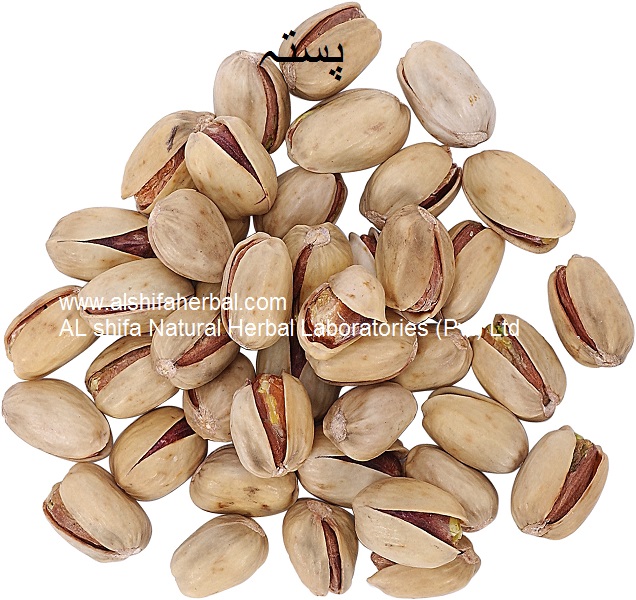
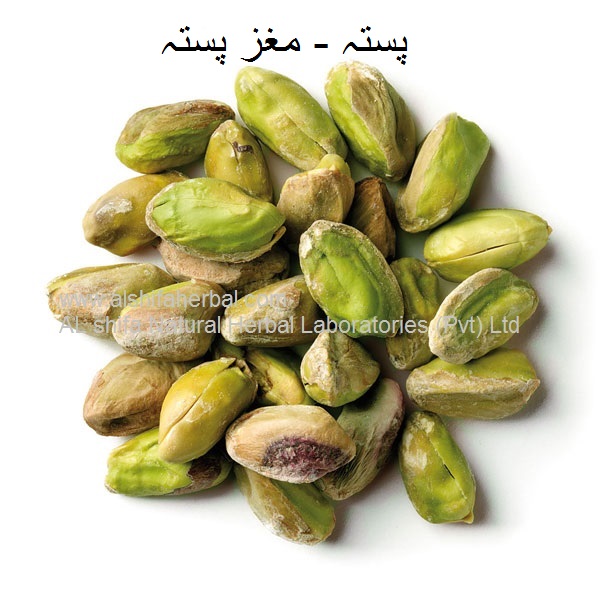

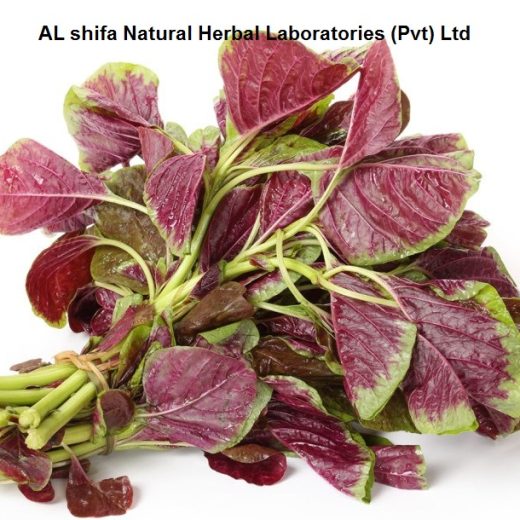
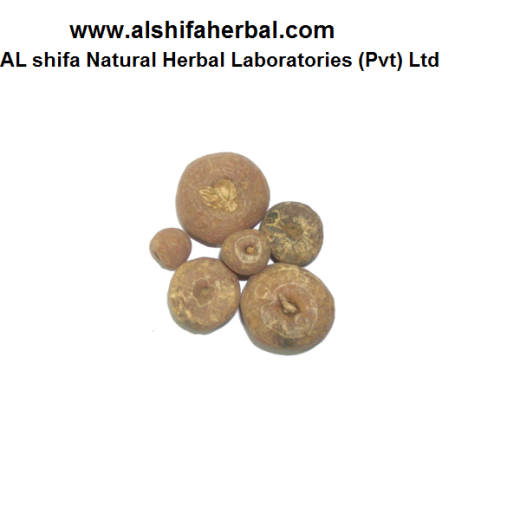
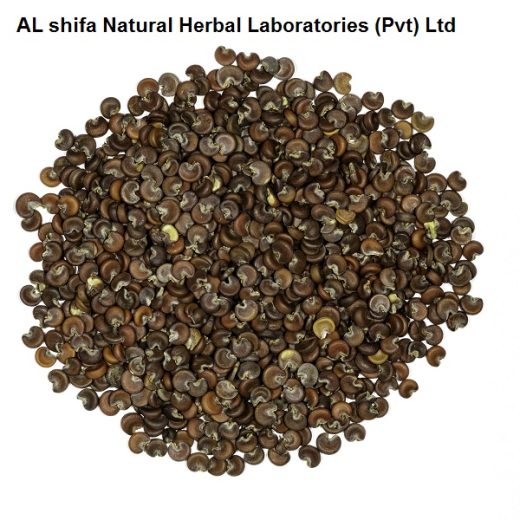



Reviews
There are no reviews yet.